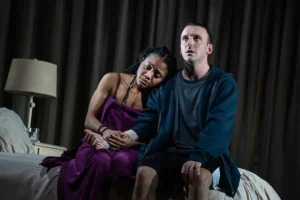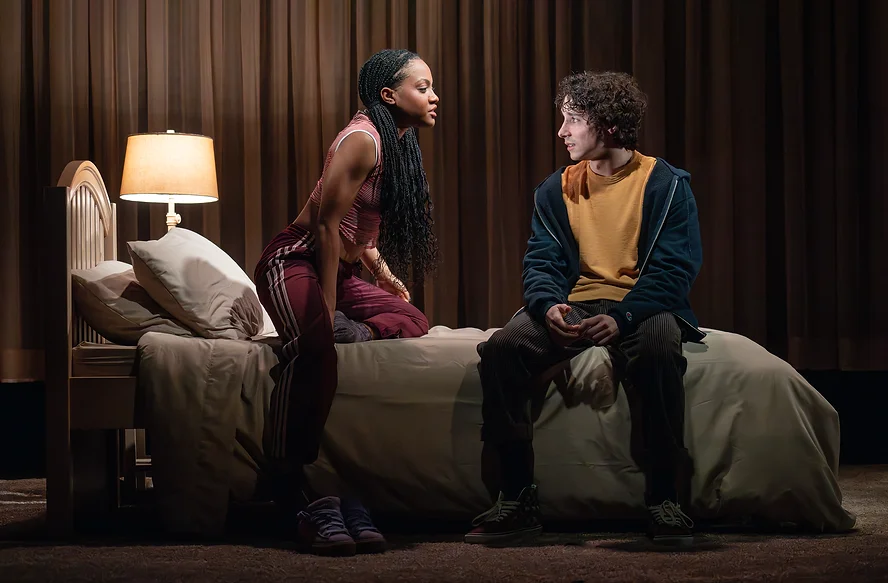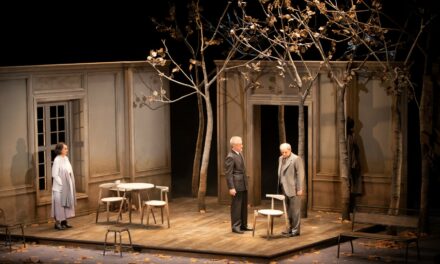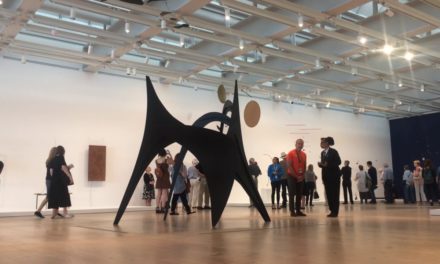Rachel Bonds’s Jonah—directed by Danya Taymor at the Roundabout’s Laura Pels Theatre— is one of those plays it’s almost impossible to write meaningfully about without spoilers. I’m no spoiler zealot. If anything, I tend to lean toward open discussion with courtesy warnings, and sometimes I don’t bother with them when a play has had a previous run and been widely discussed. With a brand new piece, though, I’m loath to ruin the suspense and surprise. Jonah is a crafty and mysterious puzzle that’s crucially reliant on one big, climactic reveal. Every critic will want to weigh in on that reveal, but I’ll have to talk around it for now.
Here’s what I can say. The show is worth seeing. It’s crisp, dynamic, lucid, and exquisitely cast. The 100 intermissionless minutes fly by quickly. Taymor has a knack for this type of intimate, small-cast work: heady talk among smart, troubled people in confined spaces, surreal touches, sexual encounters that feel edgy (think of Daddy, Heroes of the Fourth Turning, Evanston Salt Costs Climbing). The pacing, emotional build, and subtle physical movement here are all spot-on.
Gabby Beans, a marvelously distinctive actor, plays the main character Ana, introduced as a teenage scholarship student from Detroit attending a boarding school, where she is pursued by a cute, shy, comparatively privileged boy named Jonah, played with understated charm by Hagan Oliveras. Things get steamy, they exchange kisses and fantasies, and suddenly, after an abrupt, surreal light cue that seems to suck Jonah away, we meet another, somewhat older guy named Danny who turns out to be her step-brother, played by Samuel Henry Levine. Ana is African-American, Danny and Jonah are white, and oddly enough, things also get steamy between the step-siblings.
More abrupt light cues and suck-aways, and the action leaps forward in time, with no changes in costume or to the stark, beige, dormroom-cum-motel set (design by Wilson Chin). Ana is in college, then still older at a remote writer’s retreat (she’s become a writer), where another man, a lanky lapsed Mormon named Steven, pursues her. Steven is also white, just as earnest and sincere as Jonah, and played with comparably charming self-deprecation by John Zdrojeski. There are lots of hesitations, with standoffish Ana trying to keep to herself. Also dangers: she’s repeatedly menaced and threatened by Danny and can’t seem to break free. These are the mystery threads. It’s up to us to tie them together and decide which are real and which imagined.

Jonah by Rachel Bonds, directed by Danya Taymor, Roundabout at Laura Pels Theatre. Photos: Joan Marcus.
It has to be said that it’s a pleasure to watch all four of these fine actors perform. Each brings distinct, intelligent nuance to his/her role, which adds powerful particularity to the suspense in a play built very much around seemingly open-hearted dialogue that’s actually cagey.
My reservations about Jonah are mostly about its ending. I won’t give it away, but my heart sank when I saw Bond making the terribly unfortunate decision to explain her big reveal. Here’s the nub. The play’s richest thematic tension is the contrast it sets up between male and female sexual fantasies, and Bonds’s explanation reduces that tension to a platitude. Jonah is about a single damaged woman whom its female author clearly finds fascinating, but in the end, her play can’t pass the Bechdel test. Every ghost and provoking voice in Ana’s head turns out to be male.
I wanted to meet her mother and step-mother, whose bad luck and bad choices might have provided illuminated contrasts. And what about female friends? Did Ana’s fear and self-imposed isolation mean there were none? That’s worth knowing too. In the end, the character feels diminished in complexity compared to the absorbing figure introduced at the outset. Her enigma really depended on maintaining at least some of the blurry lines between types of fantasies. Sometimes, in playwriting, you have to know when you’ve thinned too much and when to leave blurry enough alone.
This article appeared in TheaterMatters on February 2, 2024, and has been reposted with permission. To read the original article, please click here.
This post was written by the author in their personal capacity.The opinions expressed in this article are the author’s own and do not reflect the view of The Theatre Times, their staff or collaborators.
This post was written by Jonathan Kalb.
The views expressed here belong to the author and do not necessarily reflect our views and opinions.


















